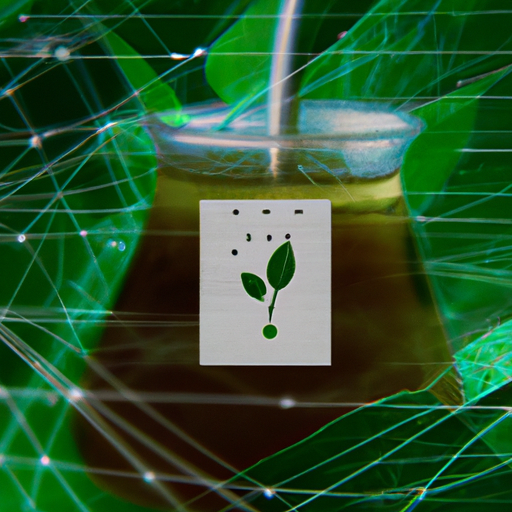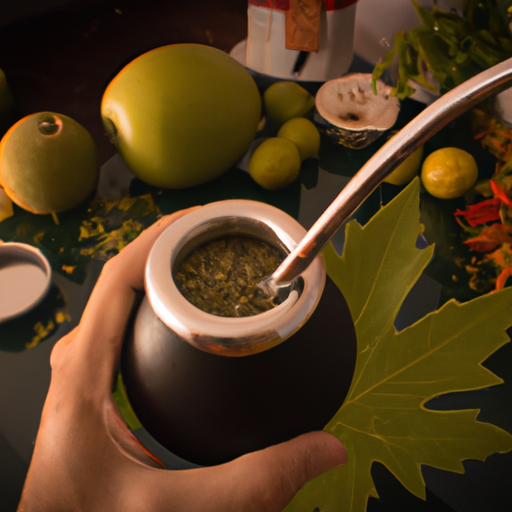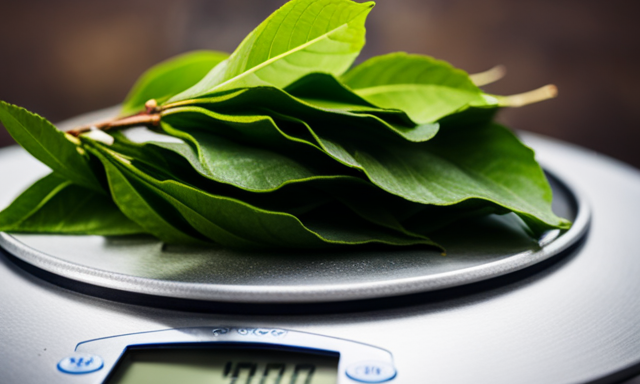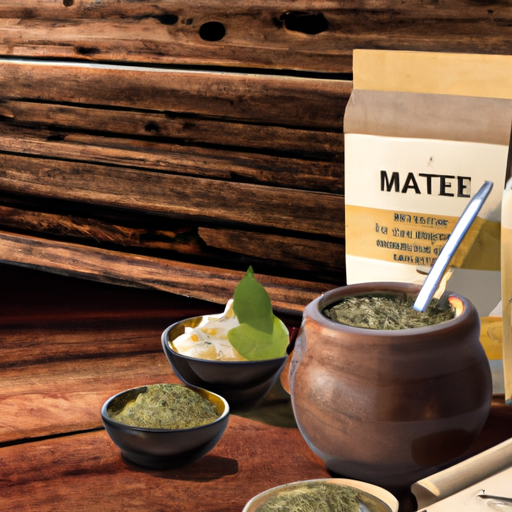As a passionate tea enthusiast, I frequently find myself pondering the caffeine content in my beloved tea varieties.
Recently, I’ve been curious about yerba mate tea bags and how much caffeine they contain.
Yerba mate is a popular South American beverage that has been touted for its numerous health benefits, but it’s also important to understand the potential impact of its caffeine content.
Caffeine is a stimulant that can have both positive and negative effects on the body.
It’s found in many beverages, including coffee, tea, soda, and energy drinks.
As someone who enjoys the occasional pick-me-up from caffeine, I’m interested in knowing just how much of it is in my yerba mate tea bags.
In this article, we’ll explore the factors affecting caffeine content in yerba mate and how it compares to other beverages.
We’ll also examine the health benefits and potential side effects of drinking yerba mate tea and provide tips for brewing your own perfect cup.
Key Takeaways
- Yerba mate tea bags typically contain 30-50mg of caffeine per serving, making it a moderate source of caffeine compared to coffee or energy drinks.
- Factors such as the type of yerba mate used, processing method, brewing time and temperature, type and quality of leaves used, and water quality can affect the caffeine content in yerba mate tea.
- Yerba mate tea bags contain beneficial compounds such as theobromine and theophylline, which can stimulate the central nervous system and improve cognitive function.
- Yerba mate tea bags are a flavorful and energizing tea option with unique flavor notes and potential health benefits, including antioxidants to protect cells from damage and anti-inflammatory properties to alleviate symptoms of arthritis and other inflammatory conditions.
Understanding Caffeine
You’ll want to know that caffeine is a stimulant that can affect your nervous system and metabolism. When you consume caffeine, it binds to adenosine receptors in the brain, which prevents adenosine from binding.
Adenosine is a neurotransmitter that promotes sleep and relaxation, so when this happens, you feel more alert and awake. The effects of caffeine can vary from person to person depending on factors such as age, weight, genetics, and tolerance levels.
Caffeine metabolism also plays a role in how long its effects last. The liver breaks down caffeine into compounds called metabolites, which are then eliminated from the body through urine. This process can take anywhere from 3 to 7 hours depending on the individual.
Factors affecting caffeine content in yerba mate tea bags include the type of yerba mate used, the processing method, and brewing time and temperature. These will be discussed further in the subsequent section.
Factors Affecting Caffeine Content
When brewing yerba mate, the caffeine content can be influenced by various factors that are as important as the notes in a symphony. The following are some of the key factors that can affect the caffeine content of your yerba mate:
-
Brewing techniques: The way you brew your yerba mate can have a significant impact on its caffeine content. For example, brewing at higher temperatures for longer periods of time can result in increased caffeine extraction.
-
Chemical composition: Yerba mate has a complex chemical composition and contains various compounds that can interact with caffeine to affect its absorption and metabolism. For instance, theobromine and theophylline are two compounds found in yerba mate that may enhance or inhibit caffeine’s effects.
Other factors that may influence the caffeine content of your yerba mate include the type and quality of leaves used, water quality, and steeping time.
It’s worth noting that while these factors play a role in determining how much caffeine ends up in your cup, it’s difficult to accurately predict how much will be extracted.
Understanding these various factors is essential when trying to determine how much caffeine is present in your cup of yerba mate tea bags.
How Much Caffeine is in Yerba Mate Tea Bags?
If you’re looking for a flavorful and energizing tea option, yerba mate tea bags could be just what you need. Yerba mate is a traditional South American drink that has gained popularity worldwide due to its unique taste and potential health benefits. One of the main reasons people turn to yerba mate is for its caffeine content, which can provide a natural boost of energy without the jitters or crash associated with other caffeinated beverages.
However, it’s important to note that caffeine content in yerba mate tea bags can vary depending on several factors. The type of yerba mate blend used, as well as the processing method and brewing time, can all affect how much caffeine ends up in your cup. Some blends may have higher levels of caffeine than others, so it’s worth checking the label or doing some research before making your purchase.
Overall, while there is no definitive answer to how much caffeine is in yerba mate tea bags, studies have shown that it typically contains around 30-50mg per serving. This makes it a moderate source of caffeine compared to coffee or energy drinks but still enough to provide a noticeable boost in alertness and focus.
When comparing caffeine content to other beverages, it’s important to keep in mind that everyone metabolizes caffeine differently and individual tolerance levels can vary greatly. However, on average, an 8oz cup of brewed coffee contains around 95mg of caffeine while an 8oz serving of black tea has about 47mg.
So if you’re looking for a milder alternative with unique flavor notes and potential health benefits, yerba mate tea bags could be worth trying out!
Comparing Caffeine Content to Other Beverages
Comparing the caffeine levels of yerba mate to other popular beverages can provide insights into its potential benefits. When it comes to caffeinated drinks, coffee is often the first thing that comes to mind. A typical 8-ounce cup of coffee contains around 95 milligrams of caffeine, while a cup of black tea has about half that amount at 47 milligrams. Yerba mate tea falls somewhere in between with an average of 30-50 milligrams per cup.
But how does yerba mate compare to other popular brands such as energy drinks and soda? Well, a can of Red Bull contains about 80 milligrams of caffeine in a standard serving size while Coca-Cola has approximately 34 milligrams per 12 ounces. It’s clear that yerba mate falls on the lower end compared to these alternatives, making it a healthier choice for those looking for a boost without all the added sugar and artificial ingredients.
When it comes to caffeine comparison among popular brands, yerba mate falls somewhere in between coffee and black tea but is much lower than energy drinks and soda. Choosing yerba mate over these alternatives can bring health benefits from its natural antioxidants and nutrients without consuming excessive amounts of sugar or chemicals.
Health Benefits of Yerba Mate Tea
As I explore the health benefits of yerba mate tea, I’m fascinated by its high levels of antioxidants which can help protect against cell damage.
Additionally, yerba mate contains caffeine and other natural compounds that can boost energy and focus without the jitters associated with coffee.
And lastly, research suggests that drinking yerba mate tea may aid digestion by promoting a healthy gut microbiome.
These are all compelling reasons to consider incorporating yerba mate into my daily routine.
Antioxidants
You’ll be happy to know that yerba mate tea bags contain a good amount of antioxidants, which can help protect your cells from damage caused by free radicals. Antioxidants are compounds that neutralize the harmful effects of free radicals in our body. Free radicals are unstable molecules produced during normal bodily functions or exposure to environmental toxins such as pollution and radiation. These molecules can cause damage to proteins, DNA, and cell membranes leading to inflammation, aging, and chronic diseases.
Yerba mate is rich in antioxidants such as polyphenols and flavonoids which have numerous health benefits. Research shows that regular consumption of yerba mate tea may reduce the risk of chronic diseases such as cancer, cardiovascular disease, diabetes, and neurodegenerative disorders. Yerba mate tea also has anti-inflammatory properties that can help alleviate symptoms of arthritis and other inflammatory conditions. Moreover, yerba mate tea bags are low in calories but high in nutritional value making it an excellent choice for those who want to maintain a healthy lifestyle without sacrificing taste or quality.
With its numerous antioxidant benefits and nutritional value, it’s no wonder why yerba mate tea is becoming increasingly popular among health-conscious individuals. But did you know that this tea also boosts energy and focus? Stay tuned for the next section where we delve into how yerba mate can help improve mental clarity and alertness!
Boosts Energy and Focus
Boosting energy and focus, yerba mate has been found to contain compounds that stimulate the central nervous system and improve cognitive function, making it a great alternative to coffee for those looking for a natural boost.
This natural energy booster also promotes mental clarity, improving productivity and helping individuals stay focused throughout the day. Studies have shown that yerba mate contains caffeine, but in lower quantities than coffee or tea. However, the caffeine content is still enough to give you an energy boost without the jitters or crash associated with other caffeinated beverages.
Additionally, yerba mate contains other beneficial compounds such as theobromine and theophylline which contribute to its stimulating effects on the body and mind. So if you’re looking for a healthier way to stay alert and productive throughout your day, consider swapping out your morning cup of coffee with a cup of yerba mate tea instead.
In addition to being an effective natural energy booster, yerba mate also aids digestion by promoting bowel movements and reducing inflammation in the digestive tract.
Aids Digestion
Improve your digestive health and feel less bloated by incorporating yerba mate into your daily routine. Yerba mate has been shown to improve digestion and gut health due to its high concentration of polyphenols, which act as antioxidants in the body.
Additionally, yerba mate contains compounds that stimulate the production of digestive enzymes, aiding in the breakdown of food and absorption of nutrients. Incorporating yerba mate into your diet can also help alleviate common digestive issues such as constipation, diarrhea, and acid reflux.
Its anti-inflammatory properties may reduce inflammation in the gut, leading to a decrease in symptoms associated with inflammatory bowel disease. Overall, adding yerba mate to your daily routine can lead to improved digestive health and a more comfortable stomach. However, it’s important to note that excessive consumption may have potential side effects on the body’s systems.
Potential Side Effects of Yerba Mate Tea
If you’re not careful, excessive consumption of yerba mate tea can lead to potential side effects such as insomnia, anxiety, and digestive issues. While yerba mate contains less caffeine than coffee or black tea, it still has a significant amount that can affect individuals differently.
Those who are sensitive to caffeine or consume large quantities of yerba mate may experience jitters, heart palpitations, and difficulty falling asleep. In addition to the short-term effects of caffeine sensitivity, long-term consumption of yerba mate has been linked to an increased risk of certain cancers.
The high temperature at which some traditional methods of brewing yerba mate involve could also increase the risk of esophageal cancer. It is important to note that these studies have been conducted on populations who drink large amounts daily over many years and do not necessarily apply to occasional drinkers.
To avoid these potential side effects and reduce the risk of long-term health issues, it is recommended that individuals limit their intake of yerba mate tea and opt for alternative sources of caffeine if they are sensitive to its effects. Additionally, brewing techniques that involve lower temperatures or shorter steeping times can decrease the amount of potentially harmful compounds in the drink.
With these precautions in mind, enjoying a cup or two of yerba mate tea can be a delicious and healthful addition to one’s routine.
Tips for Brewing Yerba Mate Tea
To brew yerba mate, start by filling a gourd or cup with loose leaves and adding hot water that isn’t boiling, as studies suggest that using boiling water may increase the risk of certain cancers.
The ideal water temperature for brewing yerba mate tea is between 150 to 160°F (65 to 70°C). If the water is too hot, it can scorch the leaves and result in a bitter taste.
Steeping time also plays an important role in determining the flavor of your tea. A typical steeping time would be around 5 minutes, but this can vary based on personal preference.
Different ways to enjoy yerba mate include adding herbs like mint or lemon balm to enhance the flavor profile. Some people prefer to sweeten their tea with honey or agave nectar instead of sugar.
You can also mix yerba mate with other teas such as green tea or jasmine tea for a unique blend of flavors.
When it comes to brewing yerba mate, experimentation is key. Try different water temperatures and steeping times until you find the perfect combination that suits your taste buds.
With its various health benefits and delicious taste, it’s no wonder why yerba mate has become increasingly popular worldwide!
Frequently Asked Questions
Can Yerba Mate Tea Bags be used for more than one cup of tea?
I’ve found that yerba mate tea bags can indeed be used for more than one cup of tea, making them a sustainable and cost-effective choice.
By reusing the same bag, you can reduce waste and get more value out of your purchase.
Additionally, yerba mate is known to have numerous health benefits such as boosting energy and improving digestion.
So by using the same bag multiple times, you can enjoy these benefits while also being mindful of the environment and your wallet.
Is Yerba Mate Tea suitable for people with high blood pressure?
Yerba Mate is a drink that’s been consumed for centuries in South America. It’s known for its numerous health benefits. When it comes to people with high blood pressure, Yerba Mate may be a suitable option. It contains compounds that have been shown to lower blood pressure levels. Additionally, Yerba Mate has also been linked to reducing inflammation and improving cardiovascular health. However, it’s important to note that more research is needed in this area before making any definitive conclusions about the effects of Yerba Mate on hypertension.
Overall, the health benefits of Yerba Mate are vast and varied, making it an excellent choice for those looking for a natural way to improve their overall health and wellbeing.
Can Yerba Mate Tea Bags be consumed while pregnant or breastfeeding?
When it comes to consuming yerba mate tea bags during pregnancy or breastfeeding, it’s recommended to proceed with caution. While yerba mate has many health benefits and safe alternatives for caffeine intake, studies have shown mixed results on its effects during pregnancy and lactation.
Some studies suggest that high levels of caffeine consumption can increase the risk of miscarriage, premature birth, low birth weight, and other complications. Therefore, it’s best to consult with a healthcare provider before consuming yerba mate tea bags while pregnant or breastfeeding.
Safe alternatives for caffeine intake include herbal teas such as chamomile or ginger tea.
What is the best time of day to consume Yerba Mate Tea?
When it comes to consuming yerba mate tea, there are both benefits and drawbacks to consider. On the positive side, yerba mate contains caffeine and other compounds that can boost energy levels, improve mental focus, and enhance athletic performance. Additionally, yerba mate has antioxidant properties that can help protect against chronic diseases like cancer and heart disease.
However, on the negative side, excessive consumption of yerba mate can lead to anxiety, insomnia, and digestive problems. To reap the benefits of yerba mate without experiencing these drawbacks, it’s recommended to consume no more than 3-4 cups per day at most.
As for when to drink it, many people find that drinking yerba mate in the morning or early afternoon is best for maximizing its energizing effects while minimizing any potential sleep disturbances later on. Ultimately though, the timing will depend on your personal preferences and tolerance levels.
How long does the caffeine effect of Yerba Mate Tea last?
After consuming yerba mate tea, the caffeine effect can last anywhere from 4 to 6 hours. However, the long term effects of caffeine tolerance can vary from person to person.
Some individuals may develop a tolerance over time and require more caffeine to achieve the same level of alertness, while others may not experience any significant changes in their tolerance levels.
It’s important to note that excessive consumption of caffeine can lead to negative side effects such as anxiety, disrupted sleep patterns, and increased heart rate. Therefore, it’s recommended to consume yerba mate tea in moderation and be mindful of your overall daily caffeine intake.
Conclusion
Well, folks, now that we’ve delved into the world of yerba mate tea and caffeine content, it’s time to wrap things up.
In conclusion, yerba mate tea bags contain approximately 30-50mg of caffeine per serving. This falls within the range of other popular caffeinated beverages like green tea and coffee. But don’t let the numbers fool you – yerba mate tea has a unique blend of antioxidants and nutrients that can provide numerous health benefits.
From boosting energy levels to aiding digestion, this South American beverage is worth exploring. Of course, as with any food or drink, moderation is key to avoid potential side effects.
So go ahead and brew yourself a cup of yerba mate tea – your taste buds (and possibly your body) will thank you for it!










